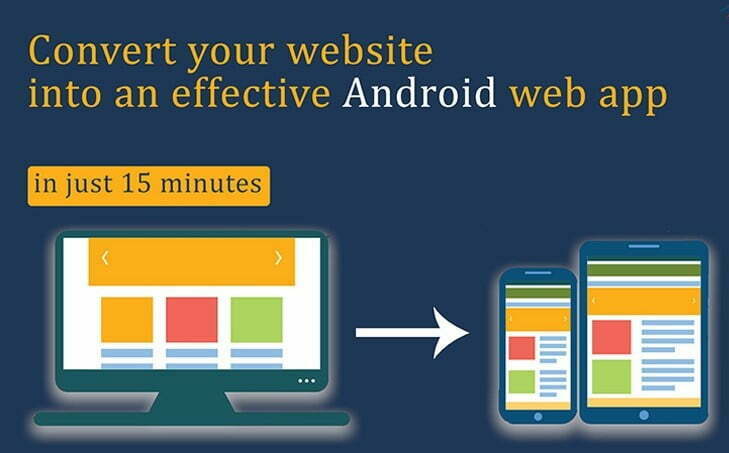You can convert your website into an Android app for several reasons. The most important ones are:
- Android has over 3 billion annual active users, accounting for over 70% of the mobile market.
- Mobile usage has significantly outstripped desktop usage in recent years.
- Users don’t always have a desktop access, but they do have access when it comes to smartphones.
A website and mobile app can help you rank higher in the SERPs.
Additionally, there are many ways to convert your website into an Android app. Whether you’re already developing a website that features a mobile-responsive or mobile-first design, you need an Android app to tap into many mobile app users.
This blog post details the steps to convert your website to an Android app. Plus, we’ll cover why you should choose Android and other ways to convert your website into an Android app. Let’s get started.
Before converting your website to an Android app
I’m ready to convert my website to an Android app, but is there anything I should know before I start? Yes, the list below describes various things to consider before you start developing an Android app for your website.
1. Budget
The first thing you should consider before starting mobile app development is your budget. This is the essential factor in determining application development’s direction (and many other things).
Several factors determine the total amount required to obtain a fully functional Android app on your website. This includes which technology to use, which approach to take, and how many features your application requires. Estimating costs is essential in determining how much budget to allocate to Android app development.
2. Safety
Security is an essential aspect of any top-notch app. Not to be missed. Even a minor vulnerability can lead to considerable information disclosure. That is why it is essential to ensure security when developing mobile apps.
Hacking activity has increased significantly over the last two decades. Thousands of cyberattacks are launched every day. Therefore, you should ensure your Android application’s highest level of security.
3. Intent
Before you start the process of converting your website to an Android app, it’s essential to understand your goals.
Want to extend the reach of your business? Any plans to do something with it in the future? I need an Android app for my website.
Regardless of your intent to develop an Android app for your website, you should emphasize the intent you want your company to achieve.
Steps to Convert a Website to an Android App
Converting a website to its Android equivalent is usually a long process with multiple steps. Let’s take a quick look at the steps to convert a website into an app.
- Feature selection and user story creation
- UI/UX design decisions
- Quotation
- Coding and development
- Deployment and production
Each of these steps is described separately here.
Step 1 – Feature Selection and User Story Creation
Converting a website into an Android app begins with feature selection. This means selecting the desired functionality of his website in the Android app.
Please note that some features make sense on the website, while others are relevant only to the mobile app. Therefore, you should create a checklist of all the features your Android application needs.
Additionally, the first step is to create user stories for developers. A detailed description of features that will save developers a lot of effort while developing an Android application, written by a project manager.
Based on your chosen features, your developer or development team will determine the best option for converting your website into an app.
Revolutionary Designers project manager will help you create a concise feature list containing only the features you need and a concise explanation of how to use them in your Android app. Developers then ensure everything goes according to plan (or better).
Step 2 – UI/UX Design Decisions
The next part of turning your website into an app involves your design team. The app’s color scheme should mirror the website’s color scheme, but the design should follow mobile-friendly cues.
Ensuring an optimal user experience is essential when developing a design scheme for an Android app. Colors should be pleasing to the eye, or at least not flashy.
Step 3 – Cost Estimate
Preparing a quote is the next step in converting your website into an app. This depends on the functionality and the level of complexity in the implementation. Adding unique functionality to your app further increases development costs.
The development team should ensure that the estimated cost budget does not exceed the allotted amount.
Step 4 – Coding and Development
The actual programming is done in this part. Here the developer should use:
- Android Studio
- integrated development environment
- RESTful APIs
- DBMS
There may be tools other than those listed above. This depends on the functionality of Android applications.
Step 5 – Deploy and go live.
The final step is to publish your completed Android app to the Play Store. Since this will be part of your website, you should add a link to download the app on your website and a heading such as “Get the Android app!” Or “Please download the Android app.”
4 Reasons to choose Android for Converting a Website to an Android App
When considering converting a website into an app, a common dilemma is whether to go for iOS or Android
We recommend choosing both, but if you have to choose one over the other, there are some excellent reasons to choose Android over iOS.
1). Wide range
Android is undoubtedly the mobile operating system with the most users as it accounts for over 70% of the mobile market. More users lead to more customers, which provides more revenue-generating opportunities.
2). Fast release
Deploying an iOS app can take up to a month. By comparison, publishing an Android app on the Play Store is a task that takes only a few days. So the decision to develop an Android app will result in faster availability to users.
3). Advanced customization
One of the main advantages of choosing Android over iOS is customization. As an open source project, developers can do various experiments with her Android app. There are thousands of 3rd party APIs you can play with.
4). High scalability
iOS apps can only run on iOS. However, Android apps can go beyond operating system limitations and run on other platforms such as BlackBerry OS, ChromeOS, and Ubuntu.
The above points favour Android, but you should also target iOS. Additionally, you can opt for hybrid mobile app development if you want to reduce development costs and effort. Revolutionary Designers also offers solutions for converting websites into iOS apps.
Conclusion:
We hope you have understood the process of converting a website to an Android app. Remember that there are different ways to do this, and choosing the right one depends on many factors, such as your budget and expertise.
If you don’t feel comfortable developing an Android app for your website yourself, ask an experienced Android app development company to do it for you. Revolutionary Designers ensure a smooth transition from website to Android app.
In addition, we ensure that your funds are used optimally. We provide resources and detailed reports to help you understand the process from start to finish.











